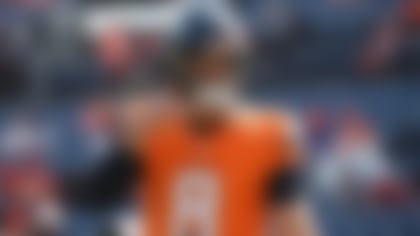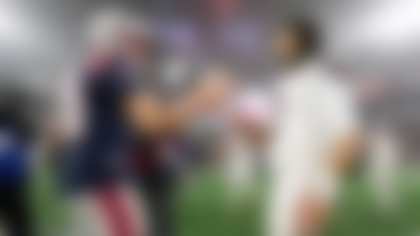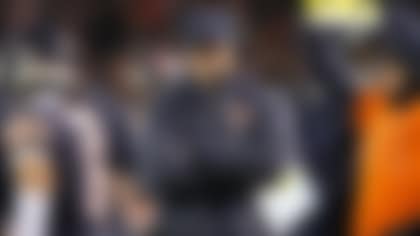LAS VEGAS -- When the New England Patriots were preparing to play the New York Giants in Super Bowl XLVI, the second time the teams met in the space of four years with the Lombardi Trophy on the line, Bill Belichick never spoke of revenge against the team that had wrecked the 2007 Pats' run at a perfect season. He focused on the current iteration of the G-Men. What was their "got to have it" play? Who was their go-to player with a game on the line?
One of the greatest upsets in NFL history -- when the Giants beat the previously undefeated Patriots in Super Bowl XLII -- was never far from anyone's mind as they prepared, though. Belichick pointed out to his team what the Giants had done well in all three phases of that game. Wide receiver Julian Edelman remembers watching the film of the first Super Bowl meeting -- a game he did not even play in because he was not yet a member of the Patriots -- hoping to glean some tendencies.
"Any time you play a team with the same coaching staff, you hear the saying, 'Same cars, different license plates.' " Edelman said. "They're going to do what they do. You can use film of the last time. It could be a completely different team, but (former Patriots offensive line coach) Dante Scarnecchia would say you can pull from those."
Super Bowl LVIII, between the Kansas City Chiefs and San Francisco 49ers, will be just the fourth rematch of head coaches in Super Bowl history, all of them occurring within five years of the first meeting. In each of the previous three rematches, the winner of the first game also won the second, a demonstration not just of coaching mastery but also of, perhaps, the psychological edge that carries over from winning the first game. That's a trend 49ers coach Kyle Shanahan hopes to buck on Sunday, along with his own rather tortured Super Bowl history, which includes being on the losing end of the Patriots' famous comeback from 28-3 when Shanahan was the Atlanta Falcons' offensive coordinator, and the 49ers' loss of a 10-point lead with seven minutes remaining in that first Super Bowl defeat to the Chiefs when Shanahan was the head coach.
Teams are almost never exactly alike season to season, in either roster or coaching staff. But given that these Lombardi rematches happened in such close proximity to the first meeting, the bones of the rosters that won one title were largely still in place for the try at the second. In each of the previous three rematches, for instance, all of the teams started the same quarterback in both Super Bowls.
Perhaps the truest rematch occurred in Super Bowls XXVII and XXVIII, when the Dallas Cowboys won back-to-back championships over the Buffalo Bills. The teams had even played a regular-season game in between the two Super Bowls, a Week 2 contest in 1993 that Buffalo won (albeit during an Emmitt Smith holdout), which caused players from both teams to recall that they felt like division opponents.
"We were the same team, they were the same team, there just was a lot of familiarity," former Cowboys quarterback Troy Aikman recalled. "We dealt with a lot in the first Super Bowl -- the K-Gun, their no-huddle. That was new; no one was doing that. We had two scout-team huddles: one would go to the ball, run the play, then the other, going fast."
The Cowboys won that first Super Bowl over the Bills, 52-17. Given that result, it's not surprising Aikman said the fact that the next Super Bowl was a rematch did not influence how the Cowboys prepared.
"There's a sense of confidence with having beaten that team before, too, which you have on your side," Aikman said.
In Buffalo, the approach was understandably different. After the Bills' first two Super Bowl losses, Buffalo quarterback Jim Kelly knew how his teammates would react to defeat on the game's biggest stage: They would be angry and anxious to get back to work. But after the third straight Super Bowl setback -- that was the 35-point shellacking courtesy of the Cowboys -- Kelly wasn't sure how his teammates would feel mentally and emotionally. The negativity around them had reached a fever pitch, he said, and so had viewership fatigue with seeing the Bills in the Super Bowl every year. The Bills knew there was a strong strain of public sentiment against Buffalo going to a fourth straight Super Bowl. It took Kelly one day of training camp in the summer of 1993 to know the Bills wanted a rematch with the Cowboys. Buffalo's motto in 1993?
"Let's piss everybody off," Kelly said. "We fought back."
When the Bills were preparing for the second game, Kelly watched the previous Super Bowl, but he also watched the Cowboys' most recent playoff contests. Buffalo head coach Marv Levy used to stress that you learn from what an opponent did before, and you try to come up with different schemes that might work.
"We made references to what, maybe in previous games, we should do differently, or we didn't do well enough," Levy said. "We have some information on this team -- not much different than a division opponent. Every game had a specific game plan. It wasn't the same as the previous one."
Kelly, who was intercepted twice on just seven pass attempts before being knocked out of Super Bowl XXVII, looked for a weakness in the secondary, as he always did, hoping to find a matchup he could exploit. The bizarre nature of Super Bowl XXVII -- the Bills turned the ball over a Super Bowl record nine times -- actually gave the Bills a dose of confidence as they prepared for the rematch.
"We knew it was going to be different," said Steve Tasker, Buffalo's special teams ace. "We didn't play like ourselves in that Super Bowl. We felt like it was going to be much different. We knew we could play much better. At least we'd play like us. There's a feeling that there are fewer unknowns."
Buffalo lost Super Bowl XXVIII, too -- 30-13 -- but that team remains particularly close knit, Kelly said. There is still a group of about 10 players on a text chain for each Bills game.
Head coach Chuck Noll never talked about rematches or having extra confidence from the Steelers' first Super Bowl victory over the Cowboys in Super Bowl X. He was about consistency, and staying true to what the Steelers did. During one regular-season meeting, Noll told his team a story about a Houston Oilers player leaving a playbook in the visitor's locker room at Three Rivers Stadium. Here's the game plan they had, Noll told his team, here are the plays. And then Noll dropped the playbook into the trash. The message, Joe Greene remembers: If the Steelers spent their time worrying what the opponent would do, they wouldn't spend enough time getting done what the Steelers wanted to do. The most important thing was not the opponent, but the Steelers themselves. Noll was a practitioner of situational football, but he also knew that Pittsburgh's brand of football could win any game. He was comfortable with the defense on the field at the end of Super Bowl X, and in the rematch, Terry Bradshaw lit up the Cowboys' Doomsday Defense.
"That's the way Chuck went at it," Greene said. "We know them, we know us, let's do what we know how to do, and to the best of our abilities. Nothing really changed all the times we played against the Cowboys that were not in the Super Bowl -- we knew them as well as they knew us. He was emphasizing, if we do what we do, we'll be alright."
Tom Coughlin felt New York's rematch against New England was an entirely different ballgame. The Giants had stunned the 18-0 Patriots in Super Bowl XLII, but the architect of the defensive effort that had undone the league's top offense -- defensive coordinator Steve Spagnuolo, who will be on the Chiefs' sideline Sunday -- had left to become the St. Louis Rams' head coach. Perry Fewell was the coordinator for the rematch four years later, and by that time, the Giants' offense had helped Big Blue become a more balanced team. Michael Strahan was retired, but Victor Cruz had arrived.
"The main difference in ours, in 42, we were playing against a team that many said was the greatest offensive machine in the history of professional football," Coughlin said. "It was still an extremely good football team for 46. You go back, but you go back for certain things you want to see. You've got to apply everything to the team you have now. You may learn something about how they attempted to attack, just from a philosophical perspective, but you sit down and look at your people and are you plus or minus at each position. You try to come up with where your advantages are right now."
In each of the two seasons in which the Giants and Patriots met in the Super Bowl, they also faced off in the regular season. The first time, in 2007, the Giants lost at home by three points in the regular-season finale. Because they chose to not rest their starters (despite the game having no impact on playoff seedings) and played the Patriots so close, the 38-35 loss actually gave the G-Men a significant dose of confidence as they went into that Super Bowl as one of the biggest underdogs in the title game's history. In 2011, the Giants beat the Patriots in Foxborough in the regular season, forcing four turnovers, getting two sacks and winning despite having fewer offensive yards. But just as important that season was that New York had to win the final two games of the regular season to take the NFC East and get into the postseason. By the time the playoffs began, the Giants had already played two do-or-die tilts, and their self-assurance grew with each one.
"We had played with them earlier in the year when they were at home, but every game is a new game," Coughlin said. "(Tom) Brady gets a safety in the end zone to start the game. 42 is the David Tyree catch. In 46, maybe the best throw and catch, and if Patrick Chung puts his face in front of Mario Manningham, that ball is going to get knocked out."
Both games ended with Brady trying for a comeback victory in the closing seconds, although Coughlin remembers the ending to Super Bowl XLVI -- with Brady barely missing on a Hail Mary to the end zone -- as feeling much different than their first meeting, when pressure on Brady pinned the Patriots deep in their own territory.
"He's almost at midfield, throwing rockets," Coughlin said of the ending of the rematch. "I couldn't even see. People came out on the field to see the end. I got hit in the back of the head as hard as I've been hit in a while."
Like Coughlin's Giants, the 49ers enter Sunday's game with a different defensive coordinator than in their first meeting with the Chiefs -- Steve Wilks instead of Robert Saleh, who is now the head coach of the New York Jets. But more importantly, Brock Purdy has replaced Jimmy Garoppolo at quarterback and the 49ers have added two of their most dynamic offensive weapons -- RB Christian McCaffrey and WR Brandon Aiyuk -- in the years since Super Bowl LIV.
Edelman came away from his own Super Bowl experiences thinking that the game is about which team makes the best adjustments to what's seen in the first few drives. And he believes the addition of so many important offensive pieces gives Shanahan an opportunity to craft a different game plan for San Francisco. But Aikman feels that's a delicate balance.
"The challenge with the extra week is teams are able to mix it up a little bit," Aikman said. "As coaches, they run the risk of changing things up and messing their own team up. But you always have to have a few wrinkles. I would imagine both of them will have something on offense and defense, an unscouted look they'll show in the game."
The biggest difference, though, may be Purdy.
"Kyle finally has a quarterback he trusts," Aikman said.
That could be the wrinkle that allows Shanahan to finally change history -- his own and the Super Bowl's.












